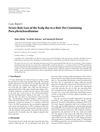Telogen Effluvium Due to Recombinant Interferon Alpha-2b
January 1992
in “
Dermatology
”

TLDR Half of the patients treated with a specific drug for skin cancer experienced hair loss not related to the drug's dosage.
In a study from 1992, 5 out of 10 patients aged 41-55 years undergoing long-term treatment with recombinant interferon α-2b (rIFN α-2b) for primary cutaneous melanoma reported significant hair loss, diagnosed as telogen effluvium through a pull test and trichogram. Telogen effluvium is characterized by an increased number of hair follicles entering the telogen, or resting, phase. Despite continuing treatment, 2 patients showed improvement in their telogen count, while the remaining 3 patients did not show improvement until the interferon therapy was discontinued. Pohl-Pinkus hair constrictions were also observed in 2 patients. The study concluded that telogen effluvium can be a side effect of rIFN α-2b therapy, and its onset and severity were not directly related to the dosage of the drug.







